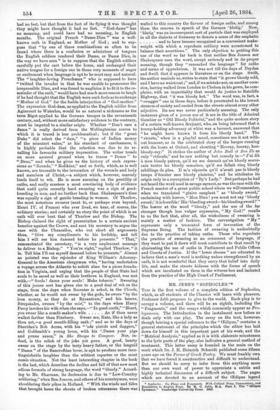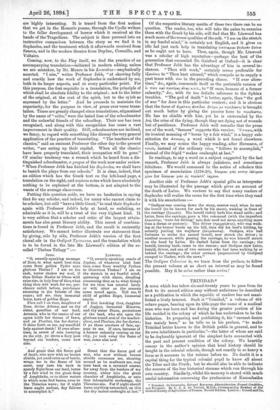MR. JEBB'S " SOPHOCLES."
Tais is the first volume of a complete edition of Sophocles, which, as all students of the Classics will learn with pleasure, Professor Jebb proposes to give to the world. Each-play is to • occupy a volume, and there will be an eighth, including the " Fragments," and the essays which commonly appear as Pro- legomena. The Introduction in the instalment now before us deals only with one play. The essay on the text, however, though bearing a special reference to the " CEdipus," contains a general statement of the principles which the editor has laid down for himself in this important part of his work, and the "Metrical Analysis," applied as it is with elaborate minuteness to the lyric parts of the play, also indicates a general method of treatment. This latter essay is founded in the main on the work which Dr. J. H. Heinrich Schmidt published some fifteen years ago on the Forms of Greek Poetry. We must frankly own that we have found it unattractive and difficult to understand. But we should bo sorry to infer from this anything more than our own want of power to appreciate a subtle and highly technical discussion of a difficult subject. The pages which are devoted to an account of the (Edipus legend • Sophocles : the Piave and Fragments. With Critical Notes. Commentary, and Translation in English Prose. By R. C. Jebb, M.A. Part. I. The " CEdiptta Tyrannua." Cambridge Univerity Press. MSS.
are highly interesting. It is traced from the first notices that we get in the Homeric poems, through the Cyclic writers to the fuller development of horror which it received at the hands of the Tragedians. The subject is then pursued into an instructive comparison between the story as we find it in Sophocles, and the treatment which it afterwards received from Seneca, and in the modern theatre from Dryden, Corneille, and Voltaire.
Coming, now, to the Play itself, we find the practice of an accompanying translation—initiated in modern editing, unless we are mistaken, by Mr. Munro in his Lucretius—emphatically asserted. " I aim," writes Professor Jebb, " at showing fully and exactly how the work of Sophocles is understood by me, both in its larger aspects, and at every particular point. For this purpose, the first requisite is a translation, the principle of which shall be absolute fidelity to the original ; not to the letter of the original, at the cost of the spirit, but to the spirit as expressed by the letter." And he proceeds to maintain the superiority, for the purpose in view, of prose over verse trans- lation. Times are greatly changed since translations, stigmatised by the name of " cribs," were the hated foes of the schoolmaster and the unlawful friends of the schoolboy. Their use has been recognised, and along with this recognition has come a vast improvement in their quality. Still, schoolmasters are inclined, we fancy, to regard with something like dismay the very general application of the practice of translating. " The teachers of the classics," said an eminent Professor the other day to the present writer, "are eating up their capital. When all the classics have been properly translated, their occupation will be gone." Of similar tendency was a remark which he heard from a dis- tinguished schoolmaster, a propos of the work now under review. " When Professor Jebb has finished his Sophocles, we shall have to banish the plays from our schools." It is clear, indeed, that an edition which has the Greek text on the left-hand page, a translation on the right, and copious notes which leave absolutely nothing to be explained at the bottom, is not adapted to the wants of the average class-room.
Putting this question aside, we have no hesitation in saying that for any scholar, and indeed, for many who cannot claim to be scholars, but still " have a little Greek," to read their Sophocles again with Professor Jebb's help at hand, so unfailing, so admirable as it is, will be a treat of the very highest kind. It is very seldom that a scholar and critic of the largest attain- ments has also great literary ability. This rarest of combina- tions is found in Professor Jebb, and the result is eminently satisfactory. We cannot better illustrate our statement than by giving, side by side, Professor Jebb's version of the first choral ode in the Oedipus Tyranuus, and the translation which is to be found in the late Mr. Liuwood's edition of the so- called " Theban Trilogy "
JEER.
"O, sweetly-speaking message of Zeus, in what spirit hart thou come from golden Pytho unto glorious Thebes ? I am on the rack, terror shakes my soul, 0 thou Dalian Healer to whom wild cries rise, in holy fear of thee,what thing thou wilt work for me, per- chance unfelt before, perchance returning in the fulness of the years ; tell me, thou immortal voice, born of golden Hope.
First call I on thee, daughter of Zeus, divine Athena, and on thy sister, guardian of our land, Artemis, who in the centre of our agora holds her throne of fame, and on Phcebas, the far-darter ; O shine forth on me, my manifold help against death ! If ever afore- time, in arrest of ruin hurrying on the city, ye drove a fiery pest beyond our borders, come now also.
. . . . . . .
And grant that the fierce god of death, who now with no brazen shields, yet amid cries as of battle, wraps me in the flame of his onset, may turn his back in speedy flight from our land, borne by a fair wind to the great deep of Amphitrite, or to those waters in which none find haven, even to the Thracian wave; for if night leave aught undone, day follows to accomplish it." Liuwoon.
" 0, sweetly-speaking oracle of Jupiter, of whatever kind hart -thou come from wealthy Python to illustrious Thebes ? I am on the stretch in my fearful mind, quivering with alarm, dreading concerning thee as to what things for me thou has uttered lately or wilt utter as the seasons come round again. Tell me, 0 child of golden. Hope, Immortal oracle.
I first invoking thee, daughter of Jupiter, immortal Minerva, and thy sister Diana, protectress of the land, who sits upon the glorious round seat of the market- place, and Phoebus, the far-darter; 0 ye three averters of fate, ap- pear to me. If once, because of a former calamity coming on the city, ye took away the flame of woe, come also now.
Grant that the fierce god of war, who now without brazen shields consumes me, shouting around as he confronts me, may turn back on a reverted coarse, far away from the borders of my country, either into the great chamber of Amphitrite, or unto that inhospitable anchorage, the Thracian sea. For if night should leave anything untouched, on this the day makes onslaught at last."
Of the respective literary merits of these two there can be no question. The reader, too, who will take the pains to, examine them with the Greek by his side, will find that Mr. Linwood has much more of the worse qualities of the crib. "I am on the stretch in my fearful mind," is certainly not English, and it gives an idle lad just such help in translating izriresFar (PaArpoir ppiva as he ought not to have. Then, again, though Mr. Linwood was a scholar of high reputation—perhaps the best of the generation that succeeded Dr. Gaisford at Oxford—it is clear that Professor Jebb has the advantage of him in several in- stances. " Thou. wilt work," certainly seems preferable for ifamt;cretc to " Thou hard uttered," which compels us to supply a past tense with shy in the preceding clause. "If ever afore- time," &c., again, commends itself as the preferable version of
gl
rovesal Trparipac arcs z.s.A., to " If once, because of a former calamity," &c., with its too definite reference to the Sphinx troubles. " The god of death" is better, again, than " the god of war " for Area in this particular context; and it is obvious that the force of elocxx.oc agyass, cpXiygt eo weptAincros is brought out much better by giving the passive force to IrEpeilierroc. He has no shields with him, yet he is surrounded by the )304, the cries of the dying, though they are dying not of wounds . but of pestilence. Professor Jebb well remarks that the prose use of the word, "famous" supports this version. 'Es-ospor, with its ironical meaning of " borne by a fair wind," is a happy sub- stitution for c2Trovpos, a word which is not found elsewhere. Finally, we may notice the happy reading, after Hermann, of Tails, instead of the ordinary riser, "follows to accomplish," instead of the frigid " makes onslaught at last."
In readings, to say a word on a subject suggested by the last remark, Professor Jebb is always judicious, and sometimes felicitous. We would commend to the notice of scholars this specimen of emendation (1218-20), ai'spopar veil) croirEp isixtwav xiono for Upoir.cat yelp as a-tpica.A.'
Another side of Professor Jebb's special gifts as interpreter may be illustrated by the passage which gives an account of the death of Lalus. We venture to say that many readers of Sophocles will realise the scene for the first time when they read it with his annotations :—
"Oedipus was coming down the steep, narrow road, when he met the herald (to be known for such by his stave), walking in front of the carriage (iryfaaiv). The herald rudely bade him stand aside ; and . Lens, from the carriage, gave a like command (with the imperfect ilAanybrriv, were for driving,' "plc 13aly need not mean anything more than a threat or gesture).- The driver (rpoxaxcivas), who was walk- ing at the horses' heads up the hill, then did his lord's bidding, by actually jostling the wayfarer (Zterpiworra). Oedipus, who had forborne to strike the sacred herald, now struck the driver ; in another moment, while passing the carriage, he was himself struck on the head by Liam. He dashed Leiria from the carriage ; the herald, turning back, came to the rescue ; and Oedipus slew Lamm, herald, driver, and one of two servants who had been walking by or behind the carriage ; the other servant (unperceived by Oedipus) escaped to Thebes, with the news."
The Oedipus Coloneus is, we trace from the preface, to follow the present volume at as short an interval as may be found possible. May it be ocius rather than serius !



































 Previous page
Previous page